Hyundai Mobis Bundle
How is Hyundai Mobis Transforming the Automotive Landscape?
Hyundai Mobis is at the forefront of the automotive revolution, but how does it sell and market its cutting-edge technologies? From its roots as an Hyundai Mobis SWOT Analysis to its current position as a leader in future mobility, the company's sales and marketing strategy is critical. Understanding how Mobis navigates the competitive automotive market is key to grasping its sustained success.
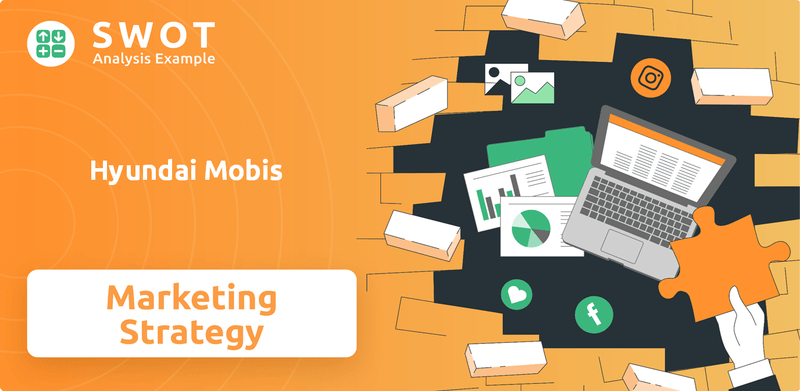
This exploration delves into the core of Hyundai Mobis sales and marketing, examining its evolution from a traditional automotive parts supplier to a key player in advanced technologies. We'll analyze Mobis's business strategies, including its approach to the global market, its innovative marketing campaigns, and its digital initiatives. Discover how Hyundai Mobis strategically positions its brand and addresses the sales and marketing challenges in the ever-changing automotive ecosystem.
How Does Hyundai Mobis Reach Its Customers?
The sales strategy of Hyundai Mobis centers on a multi-channel approach, primarily focused on business-to-business (B2B) sales due to its role as an automotive parts manufacturer. This strategy is critical for the company's success in the competitive automotive market. The company's ability to manage and optimize these channels directly impacts its financial performance and market position.
A key element of the Mobis strategy is its direct sales to original equipment manufacturers (OEMs) worldwide. This channel is essential, especially for supplying Hyundai Motor Company and Kia Corporation. Additionally, a robust network of wholesale distributors supports the after-sales service parts, ensuring broad reach for replacement parts. This strategy is crucial for maintaining customer satisfaction and vehicle longevity.
The evolution of Hyundai Mobis sales channels includes a strategic emphasis on expanding its global footprint. While direct sales to Hyundai and Kia remain foundational, Mobis has actively pursued new OEM clients and diversified its distribution network to reduce reliance on its affiliates. The increasing complexity of automotive technology, particularly in electrification and autonomous driving, has also led to more collaborative, long-term partnerships with tech companies and startups, effectively acting as a new sales channel for its advanced solutions.
This is a primary sales channel, especially for supplying Hyundai and Kia. Dedicated sales teams work closely with automotive manufacturers to integrate Mobis's modules and components. This channel is critical for maintaining strong relationships with key clients and securing long-term contracts.
A robust network of wholesale distributors is crucial for the after-sales service parts market. This channel ensures a wide reach for replacement parts, supporting vehicle longevity. It is essential for maintaining customer satisfaction and providing aftermarket support.
Mobis is increasingly forming partnerships with tech companies and startups. These collaborations are crucial for developing and selling advanced automotive solutions, especially in electrification and autonomous driving. This channel allows Mobis to stay at the forefront of technological advancements.
Expanding its global footprint is a key strategic focus. This includes increasing production and supply chain infrastructure worldwide. This strategy helps reduce reliance on affiliates and supports efficient distribution to meet growing demand.
The Hyundai Mobis marketing and sales strategy involves multiple channels to reach its target market effectively. The company's approach is designed to maximize market penetration and customer satisfaction. It is essential for the company to maintain a strong presence in both the OEM and aftermarket segments.
- Direct sales to OEMs, particularly Hyundai and Kia.
- Extensive wholesale distribution network for after-sales parts.
- Strategic partnerships with tech companies to expand product offerings.
- Continued investment in global production and supply chain infrastructure.
Hyundai Mobis SWOT Analysis
- Complete SWOT Breakdown
- Fully Customizable
- Editable in Excel & Word
- Professional Formatting
- Investor-Ready Format
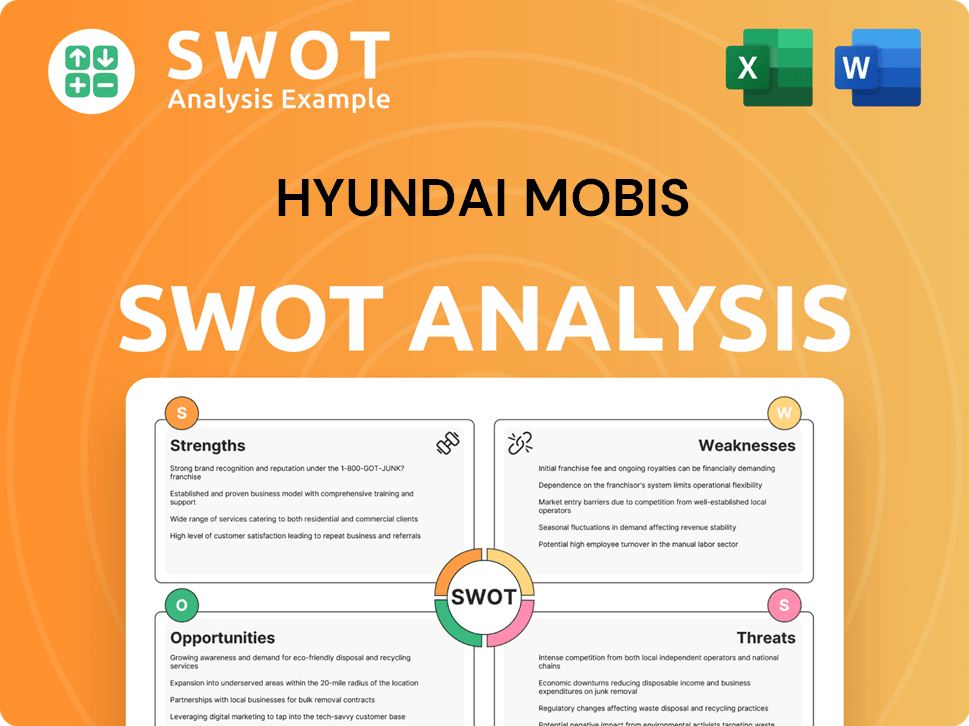
What Marketing Tactics Does Hyundai Mobis Use?
The marketing tactics of Hyundai Mobis are primarily geared towards a B2B approach, targeting automotive manufacturers and suppliers. This strategic focus is designed to support its core business of providing automotive parts and technology. The company utilizes a blend of digital and traditional marketing methods to reach its target audience effectively.
Hyundai Mobis's marketing strategy emphasizes its technological advancements and engineering capabilities. This is achieved through a variety of digital and traditional channels, ensuring a comprehensive approach to reaching its key stakeholders. The company's marketing efforts are also influenced by data-driven insights, allowing for continuous optimization and adaptability in a dynamic market.
The company's approach to Hyundai Mobis sales and marketing is designed to enhance its brand reputation and foster strong relationships within the automotive industry. This involves a combination of digital initiatives, participation in industry events, and data-driven decision-making to stay competitive.
Hyundai Mobis uses content marketing, including white papers and case studies, to showcase its expertise. They also use targeted digital advertising on industry platforms and participate in virtual trade shows. These efforts support their Mobis business objectives.
The company actively participates in major automotive and technology exhibitions, such as CES and IAA Mobility. These events provide opportunities for direct engagement with industry leaders and decision-makers, offering a tangible experience of their innovative solutions.
Hyundai Mobis analyzes industry trends and customer needs to tailor its product development and sales pitches. Data-driven insights are crucial for identifying opportunities and optimizing marketing efforts in the competitive Mobis market.
Hyundai Mobis engages in corporate social responsibility campaigns and sustainability initiatives. These campaigns are often promoted through digital channels to enhance its brand reputation and align with evolving consumer expectations.
The company's marketing efforts are predominantly B2B, targeting automotive manufacturers and suppliers. This strategic focus is designed to support its core business of providing automotive parts and technology.
Hyundai Mobis actively seeks partnerships and collaborations within the automotive industry to enhance its market position and technological capabilities. These collaborations are key to expanding its reach and innovation.
Hyundai Mobis's marketing strategy is a blend of digital and traditional methods, designed to reach its B2B audience. The company focuses on showcasing its technological advancements and engineering capabilities.
- Content Marketing: Detailed white papers, technical specifications, and case studies.
- Digital Advertising: Targeted campaigns on industry-specific platforms.
- Industry Events: Participation in major exhibitions such as CES and IAA Mobility.
- Data Analysis: Utilizing industry trends to tailor product development and sales pitches.
- Corporate Social Responsibility: Promoting sustainability initiatives.
Hyundai Mobis PESTLE Analysis
- Covers All 6 PESTLE Categories
- No Research Needed – Save Hours of Work
- Built by Experts, Trusted by Consultants
- Instant Download, Ready to Use
- 100% Editable, Fully Customizable
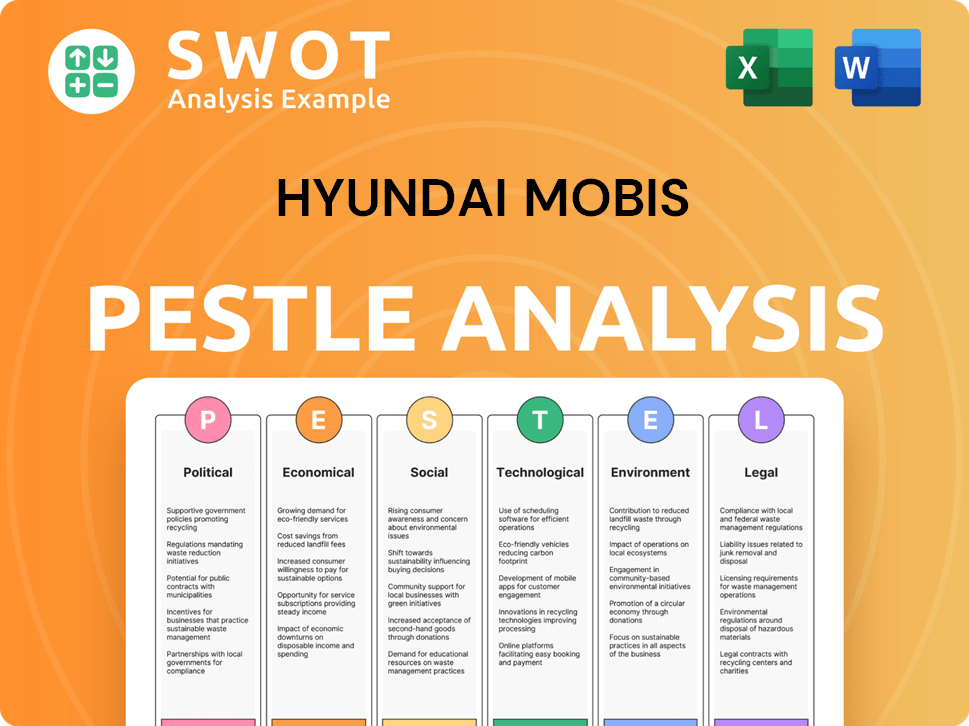
How Is Hyundai Mobis Positioned in the Market?
Hyundai Mobis strategically positions itself as a global leader in the advanced automotive components and future mobility technologies sector. This positioning emphasizes innovation, reliability, and comprehensive solutions, setting it apart in the competitive Mobis market. The core message, 'Mobility for Tomorrow,' highlights its dedication to developing cutting-edge technologies that will shape the future of transportation, including autonomous driving, electrification, and connectivity.
The brand's visual identity, often characterized by sleek, modern designs, conveys a sense of technological sophistication and forward-thinking. The tone of voice in its communications is authoritative, knowledgeable, and collaborative, reflecting its B2B focus and expert-driven approach. This approach is crucial in effectively communicating with its primary target audience: global automotive OEMs and technology partners. This focus is critical to the overall Hyundai Mobis sales strategy.
Hyundai Mobis aims to appeal to its target audience by offering integrated, high-quality solutions that enhance vehicle performance, safety, and sustainability. Their emphasis on research and development, with significant investments in next-generation technologies, underscores their commitment to innovation. This is a key component of their Mobis business strategy. For more details on their financial structure, consider exploring Revenue Streams & Business Model of Hyundai Mobis.
Offers integrated, high-quality solutions that enhance vehicle performance, safety, and sustainability. This approach is central to their Hyundai Mobis sales strategy. The focus on comprehensive solutions is a key differentiator in the automotive parts market.
Primarily global automotive OEMs and technology partners. These are the key stakeholders for Mobis marketing efforts. The company tailors its communications to meet the specific needs of this audience.
Maintains brand consistency across global operations to ensure the message of innovation and reliability resonates. This consistency is crucial for Mobis's global sales strategy. The company adapts its messaging to address shifts in industry trends and technological demands.
Significant investments in next-generation technologies, such as those related to its Integrated Chassis Control System or advanced display technologies, validate its strong industry reputation. These investments are crucial for maintaining a competitive edge. This also impacts Hyundai Mobis sales strategy for electric vehicles.
Hyundai Mobis leverages several key elements to maintain its brand positioning. These elements are crucial for its Mobis strategy and overall success in the automotive industry.
- Innovation: Continuous investment in R&D, focusing on future mobility technologies.
- Reliability: Consistent delivery of high-quality automotive components.
- Comprehensive Solutions: Offering integrated solutions to enhance vehicle performance.
- Global Presence: Maintaining a consistent brand message across various markets.
- Adaptability: Adjusting strategies to meet evolving industry trends and technological demands.
Hyundai Mobis Business Model Canvas
- Complete 9-Block Business Model Canvas
- Effortlessly Communicate Your Business Strategy
- Investor-Ready BMC Format
- 100% Editable and Customizable
- Clear and Structured Layout
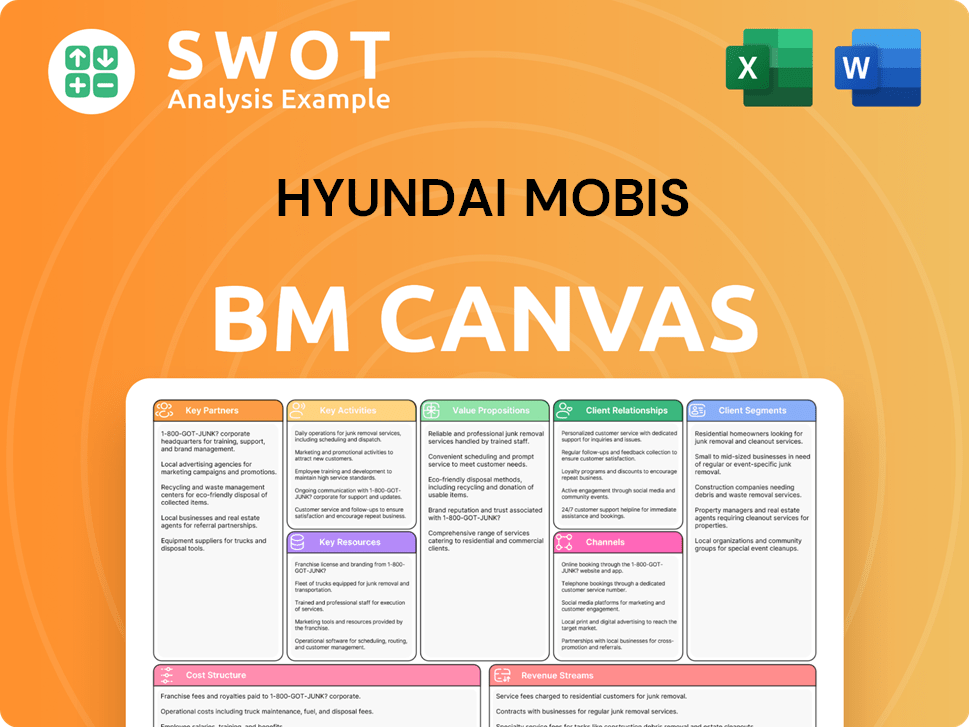
What Are Hyundai Mobis’s Most Notable Campaigns?
Given its B2B focus, Owners & Shareholders of Hyundai Mobis often see 'campaigns' as strategic initiatives and product launches. These are designed to enhance its position within the automotive industry. The company uses these initiatives to build partnerships and secure contracts.
These strategic moves are essential for driving sales and maintaining a competitive edge in the automotive parts market. This approach allows the company to highlight its technological advancements and secure new partnerships. These campaigns are crucial for showcasing its capabilities and securing its position in the industry.
The company's strategy involves leveraging industry events and specialized showcases to highlight its innovative products and technologies. They focus on building relationships with potential clients and investors. This approach is key to driving revenue growth and expanding its market presence.
In 2024, the company announced plans to invest ₩1.5 trillion (approximately $1.1 billion USD) by 2030 in software and autonomous driving capabilities. This initiative is a key element of its strategy to establish itself as a leading provider of autonomous driving solutions. The goal is to attract new OEM contracts and expand its market share.
The company focuses on electrification solutions, including battery systems and power electronics. This involves promoting its integrated charging control units (ICCU) and power electric (PE) systems through industry forums and technical publications. The objective is to become a crucial supplier for electric vehicles (EVs) and capitalize on the growth in the EV sector.
The primary channels used include industry events like CES 2024, specialized technology showcases, and direct engagement with potential clients and investors. The company emphasizes its M.Vision technologies to highlight its advancements. These channels are vital for showcasing its capabilities and forming strategic alliances within the automotive industry.
Success is measured by the increasing number of partnerships and the integration of its ADAS (Advanced Driver-Assistance Systems) solutions into new vehicle models. The increasing adoption of its electrification components by major EV manufacturers demonstrates the effectiveness of its strategy, contributing to significant revenue growth in the EV sector in 2024.
Hyundai Mobis Porter's Five Forces Analysis
- Covers All 5 Competitive Forces in Detail
- Structured for Consultants, Students, and Founders
- 100% Editable in Microsoft Word & Excel
- Instant Digital Download – Use Immediately
- Compatible with Mac & PC – Fully Unlocked
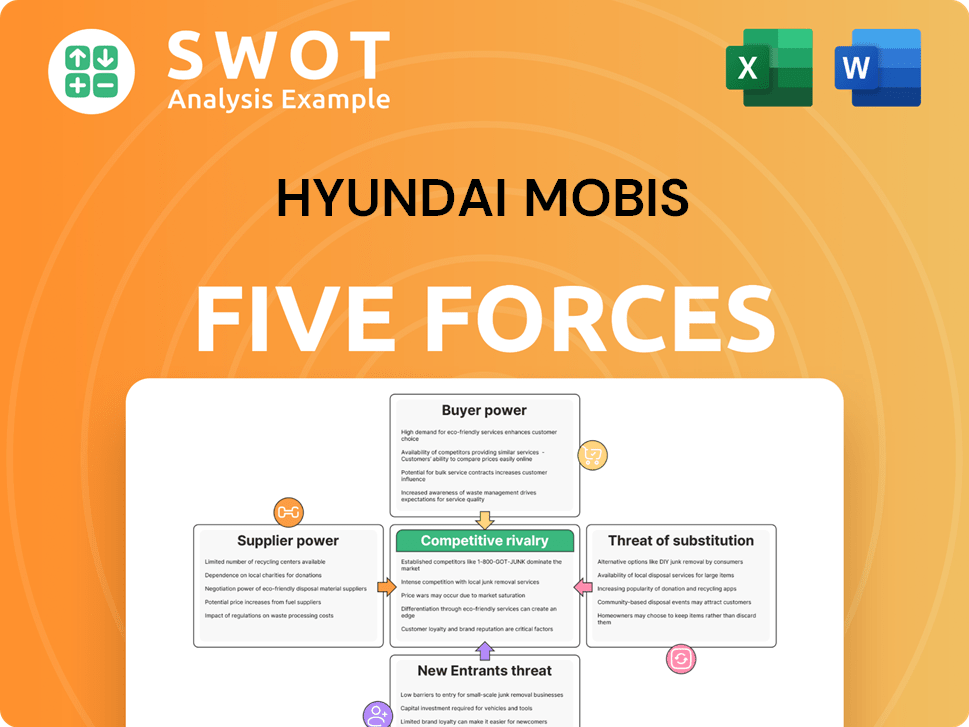
Related Blogs
- What are Mission Vision & Core Values of Hyundai Mobis Company?
- What is Competitive Landscape of Hyundai Mobis Company?
- What is Growth Strategy and Future Prospects of Hyundai Mobis Company?
- How Does Hyundai Mobis Company Work?
- What is Brief History of Hyundai Mobis Company?
- Who Owns Hyundai Mobis Company?
- What is Customer Demographics and Target Market of Hyundai Mobis Company?
Disclaimer
All information, articles, and product details provided on this website are for general informational and educational purposes only. We do not claim any ownership over, nor do we intend to infringe upon, any trademarks, copyrights, logos, brand names, or other intellectual property mentioned or depicted on this site. Such intellectual property remains the property of its respective owners, and any references here are made solely for identification or informational purposes, without implying any affiliation, endorsement, or partnership.
We make no representations or warranties, express or implied, regarding the accuracy, completeness, or suitability of any content or products presented. Nothing on this website should be construed as legal, tax, investment, financial, medical, or other professional advice. In addition, no part of this site—including articles or product references—constitutes a solicitation, recommendation, endorsement, advertisement, or offer to buy or sell any securities, franchises, or other financial instruments, particularly in jurisdictions where such activity would be unlawful.
All content is of a general nature and may not address the specific circumstances of any individual or entity. It is not a substitute for professional advice or services. Any actions you take based on the information provided here are strictly at your own risk. You accept full responsibility for any decisions or outcomes arising from your use of this website and agree to release us from any liability in connection with your use of, or reliance upon, the content or products found herein.